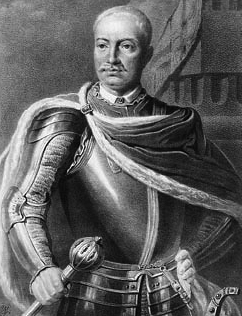
The Order of Saint Andrew the Apostle the First-Called is the highest order conferred by both the Russian Imperial Family and by the Russian Federation . Established as the first and highest order of chivalry of the Russian Tsardom and the Russian Empire in 1698, it was removed from the honours system under the USSR before being re-established as the top Russian civil and military order in 1998.

The House of Ostrogski was one of the more prominent families in the Kingdom of Poland, the Grand Duchy of Lithuania and in the Polish–Lithuanian Commonwealth. The family spanned from the 14th century Ruthenian noble Daniil Ostrogski to the 17th century Polish members. After the death of Janusz Ostrogski, the last male heir, most of the family's possessions passed to the Zasławski family.

Prince Jerzy Sebastian Lubomirski was a Polish noble (szlachcic), magnate, politician and military commander, and Prince of the Holy Roman Empire. He was the initiator of the Lubomirski Rebellion of 1665–1666 against royal authority.

Feliks Kazimierz "Szczęsny" Potocki (1630–1702) was a Polish noble, magnate, and military leader.

Prince Wladysław Dominik Zasławski-Ostrogski was a Polish nobleman (szlachcic) of Ruthenian stock. Prince of the Princely Houses of Poland, Ostroh Ordynat, Grand Koniuszy of The Crown.

Prince Dymitr Jerzy Wiśniowiecki (1631–1682) was a Polish magnate and szlachcic. Great Guard of the Crown from 1658, Field Hetman of the Crown from 1668, Great Crown Hetman from 1676, voivode of Belz 1660–1678 and Kraków 1678–1681, and castellan of Kraków from 1681. He was starost of Biala Cerkiew, Krzemieniec, Solec, Kamionka Strumilowa, Braha and Luboml.

The House of Sapieha is a Polish-Lithuanian noble and magnate family of Ruthenian origin, descending from the medieval boyars of Smolensk and Polotsk. The family acquired great influence and wealth in the Polish–Lithuanian Commonwealth during the 16th century.

Hrehory Chodkiewicz was a Ruthenian noble and military officer of the Grand Duchy of Lithuania. He was a son of Aleksander, brother of Hieronim and Yurii, and uncle of Jan Hieronimowicz Chodkiewicz. He commanded the Grand Ducal Lithuanian Army during the latter part of the Livonian War after he had become the Grand Hetman of Lithuania in 1566.

The Kraków Voivodeship was a voivodeship (province) in the Kingdom of Poland from the 14th century to the partition of Poland in 1795. Located in the southwestern corner of the country, it was part of the Lesser Poland region and the Lesser Poland Province.

Mikołaj II Radziwiłł (1470–1521), nicknamed Amor Poloniae, was a magnate and statesman of the Grand Duchy of Lithuania.

Vasily Borisovich Sheremetev was a Russian military commander and state official of Sheremetev family, boyar since 1653, voivode of Smolensk (1656-1658), later of Kiev (1658-1660?).

Jan Hieronimowicz Chodkiewicz was a 16th-century Lithuanian noble. He was Grand Pantler of Lithuania from 1559, Elder of Samogitia (1564–1579), Governor of Livonia (1566–1578), Grand Marshal of Lithuania (1566–1579), Count of Shklow 1568, Castellan of Vilnius (1574–1579). He was the elder of Telšiai and Plateliai from 1566, of Rumšiškės from 1568, and of Kaunas from 1569.
Yury Nikitich Baryatinski was a Russian knyaz, boyar and voyevoda from the Rurikid house of Baryatinsky.

Wigund-Jeronym Trubecki or Yuri Nikitich Trubetsky as he was called earlier in Muscovy was the Prince of Trubetsk from 1611 to 1634, preceded by Symeon Iwanowicz Perski Trubecki, succeeded by Piotr Trubecki, and Aleksander Trubecki. Yuri Nikitich Trubetsky was also a boyar and equestrian of False Dmitry II. After emigrating to Poland, and restoring The Principality of Trubetsk, he converted to Catholicism, and took the name Wigund-Jeronym Trubecki.
This page is based on this
Wikipedia article Text is available under the
CC BY-SA 4.0 license; additional terms may apply.
Images, videos and audio are available under their respective licenses.












